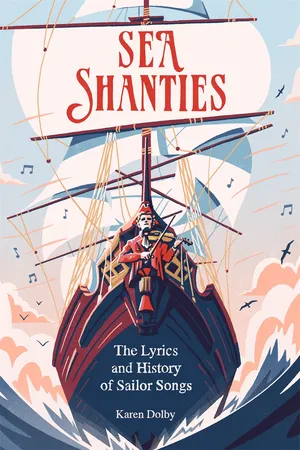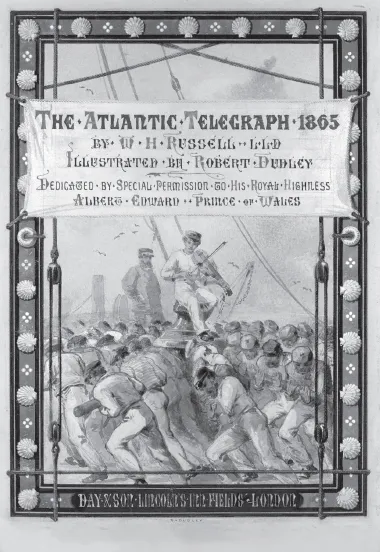![]()
HEAVING SONGS
Heaving shanties were sung to accompany work that demanded a steady heaving or pushing effort. It was usually hard labour and the songs reflect this. They were designed to help the crew maintain a regular tempo, to keep attention and amuse the men. They tend to have longer verses and many are adapted from traditional folk ballads, often bawdy with a lot of innuendo. The shanties were improvised, shortened or lengthened to match the task in hand.
![]()
WE’RE ALL BOUND TO GO
CAPSTAN, WINDLASS AND PUMPING SHANTIES
Both capstan and windlass were types of winches that performed much the same function, using ropes, chains and cables to weigh an anchor, move weighty objects, or hoist heavy sails. A capstan was a broad revolving cylinder with a vertical axis. Bars were inserted around the top for the crew to push as they trudged slowly round to wind the rope. It was repetitive, arduous work over a long period of time. Winding a heavy anchor chain, for instance, could take a whole day or more and the rhythm of capstan shanties echoes the continuous effort required. Windlasses began to take their place around the middle of the nineteenth century. A windlass had a horizontal axis with levers that had to be dragged down from the up position to move it round. They were generally more efficient and, as a result, slightly different shanties developed. Pumping bilge water from the depths of the leaky, wooden ship was a constant necessity and one of the most monotonous and detested jobs on board.
The capstan in use to weigh anchor on board The Great Eastern, 1865.
![]()
A-Roving
In Amsterdam there lived a maid
Mark well what I do say
In Amsterdam there lived a maid
And she was mistress of her trade
Chorus:
I’ll go no more a-rovin’ with you, fair maid
A-rovin’, a-rovin’, since rovin’s been my ru-i-in
I’ll go no more a-rovin’ with you fair maid
I met this fair maid after dark (×2)
An’ took her to her favourite park
Chorus
I put my arm around her waist (×2)
Says she, ‘Young man, you’re in great haste!’
Chorus
I put my hand upon her knee (×2)
Says she, ‘Young man, you’re rather free!’
Chorus
I put my hand upon her thigh (×2)
Says she, ‘Young man, you’re rather high!’
Chorus
We had a drink – of grub a snatch (×2)
We sent two bottles down the hatch
Chorus
Her dainty arms was white as milk (×2)
Her lovely hair was soft as silk
Chorus
She swore that she’d be true to me (×2)
But spent me payday fast and free
Chorus
In three weeks’ time I was badly bent (×2)
So off to sea I sadly went
Chorus
In a bloodboat Yank bound round Cape Horn (×2)
My boots an’ clothes was all in pawn
Chorus
Bound round Cape Stiff through ice an’ snow (×2)
An’ up the coast to Callyo
Chorus
An’ then back to the Liverpool Docks (×2)
Saltpetre stowed in our boots an’ socks
Chorus
Now when I got back home from sea (×2)
A soldier had her on his knee
Chorus
A-Roving’ is also known as ‘The Maid of Amsterdam’ and is one of the oldest capstan shanties. It is likely adapted from an early story ballad and may date back to the Elizabethan age. It was certainly widely known and there are French, Danish, Dutch and Flemish versions.
There are many variations but the lyrics all tell a similar cautionary tale. The last four verses are probably a later addition. Saltpetre along with guano and other nitrates was traded from the west coast of South America from the middle of the nineteenth century.
![]()
The Banks of Newfoundland
You bully boys of Liverpool, I’ll have you all beware
When you sail on them packet ships, no dungaree jumpers wear
But have a big monkey jacket all ready to your hand
For there blows some cold nor’westers on the Banks of Newfoundland
Chorus:
We’ll scrape her and we’ll scrub her
With holystone and sand
For there blows some cold nor’westers
On the Banks of Newfoundland
We had Jack Lynch from Ballynahinch, Mike Murphy and some more
I tell you well, they suffered like hell on the way to Baltimore
They pawned their gear in Liverpool and sailed as they did stand
For there blows some cold nor’westers on the Banks of Newfoundland
Chorus
Now the mate he stood on the fo’c’sle head and loudly he did roar
‘Come rattle her in me lucky lads, you’re bound for America’s shore
Come wipe the blood off that dead man’s face and heave or you’ll be damned
For there blows some cold nor’westers on the Banks of Newfoundland’
Chorus
So now we’re off the hook me boys and the land is white with snow
And soon we’ll see the pay table and we’ll spend all night below
And on the docks, come down in flocks, those pretty girls will stand
Saying, ‘It’s snugger with me than on the sea, on the Banks of Newfoundland’
Chorus
The shallow, icy waters of the Grand Banks of Newfoundland were notoriously treacherous for ships to navigate, especially in the winter, when strong winds made sailing there even more hazardous. It was a difficult journey for the sailors, the packet rats who sailed back and forth across the northern Atlantic from Liverpool to New York, but also for the migrant passengers. They were confined below decks in the worst weather, often seasick, and, not uncommonly, with the dead bodies of fellow migrants who hadn’t survived the crossing. Des...



